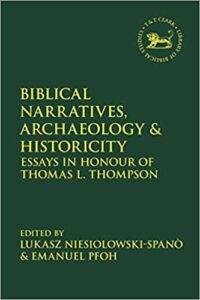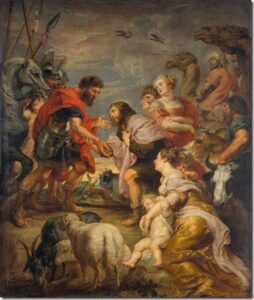 Part 2 on Łukasz Niesiolowski-Spanò‘s chapter, “The Abraham and Esau-Jacob Stories in the Context of the Maccabean Period”, in Biblical Narratives, Archaeology and Historicity: Essays In Honour of Thomas L. Thompson.
Part 2 on Łukasz Niesiolowski-Spanò‘s chapter, “The Abraham and Esau-Jacob Stories in the Context of the Maccabean Period”, in Biblical Narratives, Archaeology and Historicity: Essays In Honour of Thomas L. Thompson.
The title of this and the previous post may read as declarative but my intent is to share thought-provoking explorations rather than state dogmatic conclusions.
. . .
The Genesis portrayal of Jacob is unlike other biblical narratives in which a heroic figure chosen by God momentarily falls from favour among his peers only to rise again to a more highly exalted status (e.g. Joseph, Gideon, David). In Genesis, Jacob is the second born and cheats his way to take the position of the older sibling.The second part of Łukasz Niesiolowski-Spanò’s [NS] chapter focuses on the Jacob-Esau narrative in Genesis. It does so by comparison with the parallel account in the Book of Jubilees, a book generally dated to the late second century BCE. The Genesis story of the two brothers, we well know, ends with their unexpected reconciliation. In Jubilees (chapters 37–38), though, Jacob kills Esau. Jacob’s sons then attack and subdue Esau’s people making the Edomites tribute-paying subjects of Israel “until this day”. How could such opposite narratives come about?
Jacob depicted in Genesis is not the hero who falls, and loses, to rise to a triumphal victory. He is rather described as the lucky dodger. The stories about Jacob struggling with an angel, staying at Laban’s house and especially competing with his brother do not represent the typical plot of the falling-and-rising hero. (p. 55)
NS suggests that the author of this Genesis tale was inviting his audience to appreciate Esau and not to think poorly of him even though they identify with Jacob.
Readers obviously sympathise with Jacob, yet it might have been Esau who was intended to be the central figure of this part of the story. Therefore, the story allows the interplay of the protagonists’ successes and failures. In this way, the narrative’s attractiveness and the intellectual value of the story are proportionally higher since the story is less straightforward. The demanding reader needed more sophisticated accounts. (p. 55)
But what are we to make of the Jubilees’ version with its conclusion so opposing the drama in Genesis? In Genesis we are reading an adventure that presumably explains a friendly relationship between peoples, the Jews and the Edomites, while in Jubilees we find an etiological explanation for Jewish conquest of Edom. Genesis dialogue leaves no question that the story is etiological: God explains to Rebekah at the moment she was giving birth to the twins,
The LORD said to her, ‘Two nations are in your womb . . . one people will be stronger than the other, and the older will serve the younger.’ – Genesis 25:23

In NS’s view, the Jubilees story with its violent conclusion has a simpler and “more natural” coherence. In Genesis, Jacob’s fear for the safety of his family and his placing his most loved ones in the farthermost positions for their comparative safety,
The version in Jubilees seems to be better-constructed in regard to the narrative’s dynamics: Jacob’s fears, leading him to protect the most beloved ones by placing them at the end of the caravan (Gen. 33:1-3), does not find a logical culmination in Genesis. The canonical version, in which two brothers hug one another (Gen. 33:4), is dramaturgically less natural than the version in Jubilees, where the tension ends with war as the narrative climax . . . (p. 56)
Perhaps. I do like the sophistication of the literary structure here and see in it a masterful buildup of suspense and fear that makes the reconciliation all the more dramatically overwhelming. NS had already spoken of the sophistication of the Genesis narrative in the context of the complex position and character of Jacob and his fall from grace.
One thing is surely evident, as NS points out: At the time of the writing of Jubilees, apparently in the late second century BCE, the status of the Genesis stories had not had time to become canonical. There was still room for debate. Continue reading “Origins of the Jacob-Esau Narrative”
